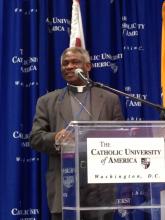nuclear arms

THE INTERNATIONAL community has agreed that nuclear weapons should be eliminated, and the rhetoric surrounding these weapons sounds promising at times, but little has been achieved to reach a world free of nuclear weapons.
President Obama is the first sitting U.S. president to visit Hiroshima, Japan, the site of the first nuclear weapon used in war, and his speech there in May was beautifully crafted, highlighting his personal commitment to this issue. However, his words haven’t matched his actions as president.
Not only have the U.S. and other nuclear-armed states failed to fulfill their commitments to nuclear disarmament, but each is currently pursuing enormously expensive upgrades and modernization programs. These countries are developing new, more-modern nuclear weapons and delivery systems, extending the planned possession of nuclear weapons for decades to come.
Twenty-five years after the end of the Cold War, more than 15,000 nuclear weapons still exist. Nine nations still possess them: the U.S. and Russia have 93 percent of the world’s nuclear warheads, followed by China, the United Kingdom, France, India, Pakistan, Israel, and North Korea. Many more states, such as all NATO members, together with Australia, Japan, and South Korea, are part of extended nuclear deterrence agreements—some even stationing nuclear weapons on their territory.
By allowing such a large number of nuclear weapons to remain, the risk of an accident increases. Nearly 1,800 nuclear warheads are kept on high alert, ready to launch within minutes. New research paints a worrying picture of near misses, security breaches, and other events that could cause catastrophe. Some say that the risk of a nuclear detonation is higher today than at the end of the Cold War.
IN HIROSHIMA, Obama called for a “moral revolution” in order to reach a world free of nuclear weapons. But such a moral revolution will not be led by those who possess these weapons of mass destruction. Instead, the world is witnessing a surge in leadership from around the globe. A new focus on the humanitarian impact of nuclear weapons has emerged that looks at these weapons for what they are: indiscriminate, inhumane, and unacceptable.

IN 1978, a Sojourners subscriber sent me this quote from a European newspaper reporting on Billy Graham’s visit to the Nazi concentration camp in Auschwitz, Poland: “The present insanity of the global arms race,” Graham said, “if continued, will lead inevitably to a conflagration so great that Auschwitz will seem like a minor rehearsal.” The U.S. media had not reported on Graham’s statement.
I wrote to Billy Graham and asked if what he said, after visiting Auschwitz for the first time, indicated a change of heart for him on nuclear weapons. Billy wrote back to say it did. He agreed to an interview with Sojourners to explain how his thinking had changed about the nuclear arms race, saying that it felt to him like a moral and spiritual question and not just a political issue.
August marks the 71st anniversary of the U.S. atomic bombing of Hiroshima, Japan. When President Obama visited Hiroshima earlier this year, he encouraged leaders to “pursue a world without nuclear weapons” (which is sadly and dangerously ironic coming from a president who is overseeing a 30-year, $1 trillion upgrade of the U.S. nuclear weapons arsenal).
Billy Graham, in that 1979 interview with Sojourners, was clear in his view of the threat posed by nuclear weapons:
Is a nuclear holocaust inevitable if the arms race is not stopped? Frankly, the answer is almost certainly yes. Now I know that some people feel human beings are so terrified of a nuclear war that no one would dare start one. I wish I could accept that. But neither history nor the Bible gives much reason for optimism. What guarantee is there that the world will never produce another maniacal dictator like Hitler or Amin? As a Christian I take sin seriously, and the Christian should be the first to know that the human heart is deceitful and desperately wicked, as Jeremiah says. We can be capable of unspeakable horror, no matter how educated or technically sophisticated we are. Auschwitz is a compelling witness to this.

On April 11, 1963 Pope John XXIII published an encyclical some initially dismissed as naive and myopic, as too liberal and too lofty. But today, his "Pacem in Terris" is generally lauded as genius and prophetic – well ahead of its time on the issues of human rights, peace, and equality.
As Maryann Cusimano Love, a Catholic professor of international relations, notes, the same year “Pacem in Terris” was published, spelling out the theological mandate for political and social equality for all people, women in Spain were not allowed to open bank accounts, Nelson Mandela was standing trial for fighting apartheid, and Walter Ciszek was serving time in a Soviet gulag simply for being Catholic.
On Monday and Tuesday, the Catholic Peacebuilding Network hosted a two-day conference at the Catholic University of America, commemorating 50 years since the publication of "Pacem in Terris.”

A 53-nation nuclear summit opens today in Seoul, South Korea. On the agenda are efforts to stop North Korea’s nuclear weapons program and to prevent Iran from acquiring them, further reductions in the US and Russian stockpiles, and preventing terrorist group from getting radiological materials.

The Nuclear ‘Implementation Study’; The Unpersuaded; Latinos See Rise In Poverty & Unemployment; When Will The Christian Right Return To The Teachings Of Their Gospel? (OPINION); What Does the Kony Viral Video Say About Us?; Why It's OK To Let Apps Make You A Better Person; Annan Leaves Syria Without A Deal; Do Atheists Need Religion? (OPINION); Obama's Religion Still A Campaign Issue: Many Alabama, Mississippi Voters Believe President Is Muslim.

The Surprising Faith Of 8 American Presidents (OPINION); Santorum Questions Obama's 'World View,' Not Faith; Educating Two Generations (OPINION); The Inside Story On Climate Scientists Under Siege; Obama's 'Radical' Option For America's Nuclear Future; Pain Without GainFacing Death, A Top Pastor Rethinks What It Means To Be Christian; The End Of Church (OPINION).

New regulations increase accountability and boost quality in Head Start programs. Economic statements from the GOP presidential contenders. "Occupy" groups plan march from New York City to Washington, D.C. Our expensive, expanding nuclear weapons complex. Evangelicals call for nuclear cutbacks. Mississippi rejects abortion amendment. Ohio repeals anti-union law. And is Occupy Wall Street overshadowing itself?
Rise of the Planet of the Apes is a surprising addition to the typical summer blockbuster canon -- for one thing, it manages to entertain and challenge, without resorting to gratuitous violence to make its point. But there's a deeper subtext that is even more unexpected -- for this is a story in which we start to lose.
It was fashionable in the late 1960s and early '70s for science fiction films to attempt to out-dystopia each other -- see for example the notion in Soylent Green that post-industrial humanity snacks on itself to survive, the suggestion that only robots can be trusted to look after creation in Silent Running, and the climactic revelation in the original Planet of the Apes that a few generations from now, the nuclear arms race will end in mutually assured destruction. All these point to a simple philosophical idea: that humans cannot be trusted to care for ourselves or the planet we steward.